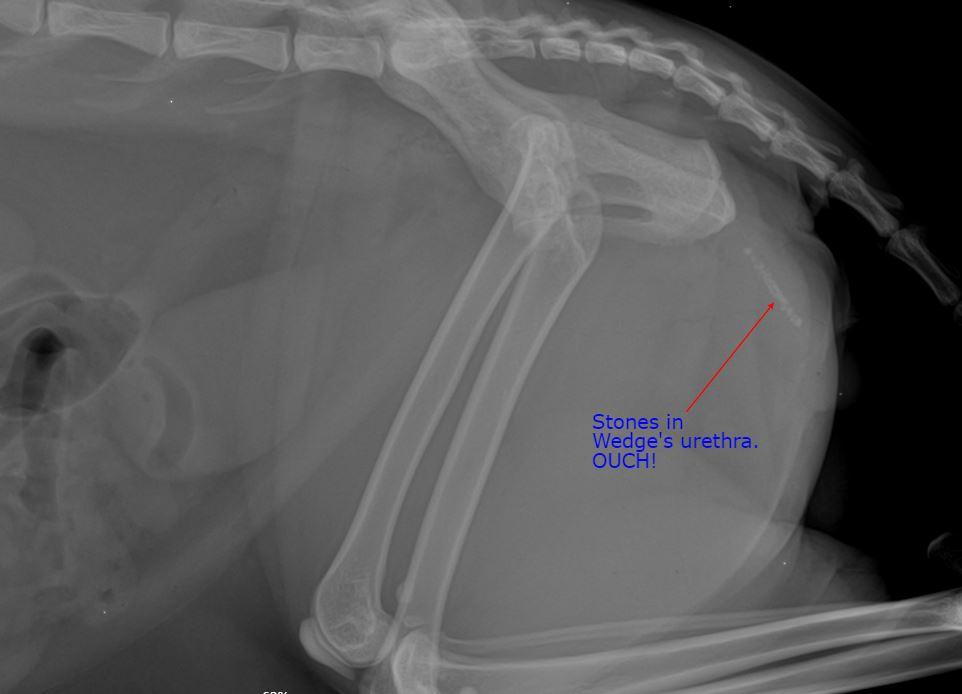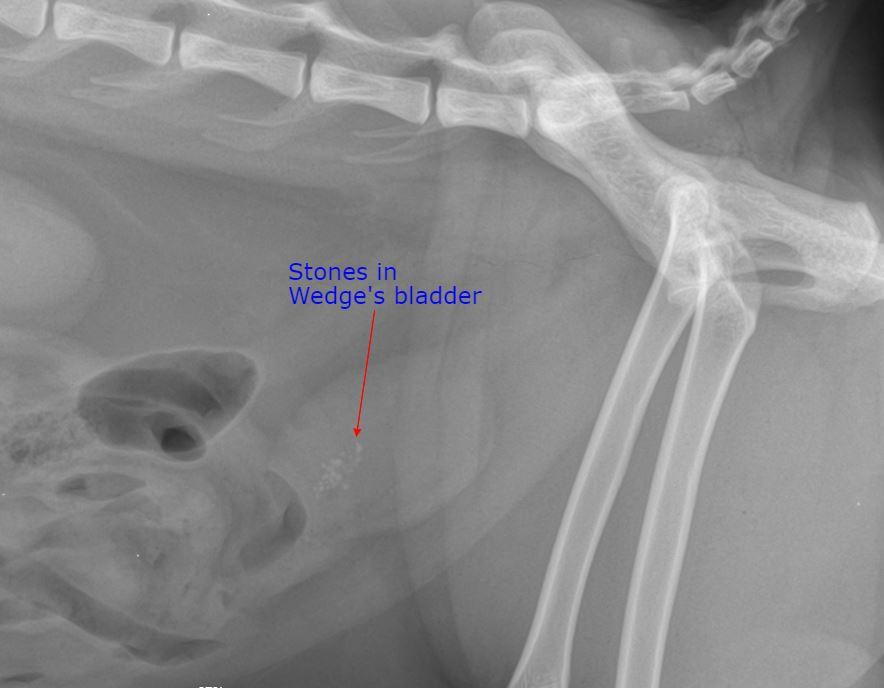Wedge is a beautiful 8 year old orange tabby who, up until recently, had been in perfect health. He ate a combination of wet and dry food from the pet store. One day, Wedge's owners noticed that he was straining to urinate outside of the litter box, vocalizing when he attempted to urinate, and passing urine that looked like it contained blood. Of course, they immediately rushed him to their vet!
Poor Wedge was very uncomfortable. On examination, he had a thickened bladder and bloody urine. The veterinarian was concerned that he might have bladder stones. An x-ray was taken of his abdomen which confirmed the stones. Unfortunately, not only did Wedge have several small bladder stones, but, also had multiple stones lodged in his urethra (the tube that carries urine out of the bladder). It was very difficult for him to pass urine, which was causing him a significant amount of pain.

Bladder stones are not normal in any animal; but, their presence is often an emergency in male cats. A male cat's urethra has a bit of a design flaw. It is very narrow, and becomes narrower (down to the diameter of a pencil lead) as it exits the body! This poor, funnel-like, design allows for stones to become lodged in the urethra before they are able to exit the body. In most cases, this causes a complete obstruction of the urethra. Have you ever been stuck waiting for a bathroom break, to the point of being in pain? These poor kitties can't empty their bladder, and it continues to fill. Without immediate veterinary care, these cats will quickly deteriorate, with kidney failure, life threatening electrolyte disturbances, severe pain, bladder rupture and death.
Miraculously, Wedge was still seemingly able to urinate around his obstruction. A catheter was placed in his urethra; the stones were flushed back into his bladder where they would not pose an immediate problem. A few of the smaller stones were passed in Wedge's urine. The stones were analysed at a laboratory and determined to be Calcium Oxalate stones. Unfortunately, these type of stones will not dissolve with treatment; so, Wedge was scheduled for surgery.

On the day of surgery, Wedge was admitted to Gateway Pet Hospital. His surgical team successfully removed a large number of small stones from his bladder.
Is this something that could happen to your cat?
Unfortunately, urethral blockages are a common occurrence in male cats. This can occur with bladder stones, but also much more innocuous substances, like small clumps of blood, mucus, inflammatory cells or crystals.
Preventing the formation of urinary crystals and stones is important in ALL cats, both male AND female. Even though female cats are less likely to become obstructed with the stones (they will usually be able to pass them) the presence of urinary crystals and stones in the bladder still causes inflammation of the bladder lining, a painful condition called cystitis. Symptoms of cystitis include urinating outside of the litter box, straining to urinate, more frequent urination, and painful urination.
So, let's talk about how to promote optimal urinary health in your cat. DILUTION IS THE SOLUTION! The more moisture your cat eats or drinks, the more dilute his urine becomes; therefore, less likely to develop crystals or stones. Encourage your cat to drink water by ensuring that he has lots available, and cater to his preferences (...these are cats, after all!). Many cats will drink more from a running source, like a cat water fountain or a dribbling tap. Some prefer bottled water, some toilet water; some prefer warm, others like cold; some like your favourite vase, that old plastic cup, or a glass bowl.
What about diet?
Diet is very important. Contrary to popular belief, in most cases it is healthier for your cat to be eating a canned diet. A high quality canned food is higher in protein, lower in carbohydrate, and much higher in moisture than most dry diets. In addition, there are some foods that have been specifically formulated to balance mineral contents to prevent urinary crystals, and some foods that even promote water consumption. We see much lower rates of urinary crystal formation with cats on wet food; especially, on prescription diets that are meant to prevent urinary crystal formation.
Cat won't eat wet food?
These "dry food addicts" can sometimes be encouraged to switch to wet food, ask your veterinary team for advice on this; otherwise, prescription dry diets meant to prevent crystal formation are your best bet.
Remember, it is important to bring your cat in every year for a visit with your veterinarian to discuss ways to optimize your cat's health and encourage early detection of any health problems. If your cat is having any urinary symptoms, such as urinating outside of the litter box, it is important to address these problems immediately. Not all cats that urinate outside the litter box do so for medical reasons, but it is important to rule that out and discuss medical and behavioural solutions with your veterinarian.
Wedge has made a full recovery, and is currently on a special diet to help prevent future stones from forming.